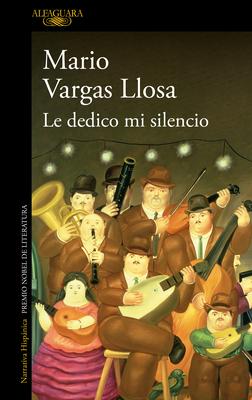
Book
Le Dedico Mi Silencio / I Give You My Silence
(Write a Review)
Paperback
$23.95
"The waltz, born in the alleyways of Lima, integrated Peru. Here I tell this story, and with it I thank a secret love that has been with me my entire life: the love I feel for Creole music, specially, for my country's waltz." --Mario Vargas Llosa
Too Azpilcueta, Creole music expert, discovers a guitar virtuoso, Lalo Molfino, whose talent seems to confirm every instinct: his profound love for Peruvian waltzes, marineras, polkas, and huaynos has social grounds. Maybe what happens is that Creole music is in fact not just a symbol of an entire country's identity and the expression of a very Peruvian attitude, huachaferia ("Peru's greatest contribution to universal culture," according to Too Azpilcueta), but something of far greater importance, an element capable of igniting a social revolution, of tearing down prejudices and social barriers to unite a country in one brotherly, mixed-race hug. In a country fractured and devastated by Sendero Luminoso's violence (the novel is set at the beginning of the nineteen-nineties, at the height of the terrorist campaign, ) music could remind society at large that they are brothers and sisters, and fellow countryfolk. And it is possible that Lalo Molfino's virtuosity has much to do with this. Too Azpilcueta is set to investigate more about this guitar player, go to his birthplace, get to know this elusive character, learn his personal history, his family history, and his love stories, how he became such a magnificent musician. And he is also determined to write a book about Creole music and develop the idea inoculated in his mind after finding this extraordinary musician.
"The waltz, born in the alleyways of Lima, integrated Peru. Here I tell this story, and with it I thank a secret love that has been with me my entire life: the love I feel for Creole music, specially, for my country's waltz." --Mario Vargas Llosa
Too Azpilcueta, Creole music expert, discovers a guitar virtuoso, Lalo Molfino, whose talent seems to confirm every instinct: his profound love for Peruvian waltzes, marineras, polkas, and huaynos has social grounds. Maybe what happens is that Creole music is in fact not just a symbol of an entire country's identity and the expression of a very Peruvian attitude, huachaferia ("Peru's greatest contribution to universal culture," according to Too Azpilcueta), but something of far greater importance, an element capable of igniting a social revolution, of tearing down prejudices and social barriers to unite a country in one brotherly, mixed-race hug. In a country fractured and devastated by Sendero Luminoso's violence (the novel is set at the beginning of the nineteen-nineties, at the height of the terrorist campaign, ) music could remind society at large that they are brothers and sisters, and fellow countryfolk. And it is possible that Lalo Molfino's virtuosity has much to do with this. Too Azpilcueta is set to investigate more about this guitar player, go to his birthplace, get to know this elusive character, learn his personal history, his family history, and his love stories, how he became such a magnificent musician. And he is also determined to write a book about Creole music and develop the idea inoculated in his mind after finding this extraordinary musician.
Paperback
$23.95